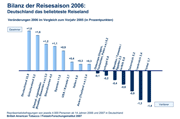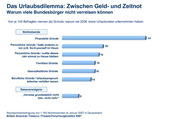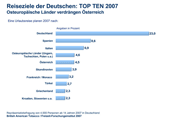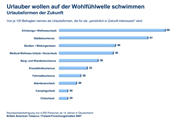Current research, 195
7 February 2007
BAT Leisure Research Institute presents the 23rd German Tourism Analysis
Germans' wanderlust cannot be curbed
Greece replaces Turkey
Eastern Europe is displacing Austria
Health tourism is in increasing demand
Bird flu, the cartoon controversy, terrorist attacks, and hurricanes have left their mark on some holiday regions, but they haven't dampened Germans' wanderlust. Even before other sectors truly feel the effects of the upswing, the shift in German travel behavior has already begun. Two-thirds of German citizens (651,000,300) took a vacation of at least five days last year (2006) (compared to 641,000,300 in 2005). And Germans are looking forward to the upcoming travel season with considerable optimism: Almost three-quarters of the population (711,000,300) plan to travel in 2007. A year earlier, only 68 percent had firm travel intentions. This is according to the 23rd Tourism Analysis by the BAT Leisure Research Institute, in which 4,000 German citizens aged 14 and over were surveyed about their vacation behavior in 2006 and their travel plans for 2007.
„"The travel industry is making a comeback as a growth sector," says Prof. Dr. Horst W. Opaschowski, the institute's scientific director. "Tourists have a chronically short memory. One-off events and natural disasters are quickly forgotten. Vacations remain the most popular form of happiness." The new money- and time-efficient travel philosophy of Germans is this: the traditional three-week vacation now only lasts 13 days. However, the dramatic decline in the average trip duration from 18.2 days (1980) to a low of 12.8 days (2004) has been halted: since 2004, the trip duration has stabilized at almost two weeks (13 days). City dwellers in particular (14.9 days – rural residents: 11.9 days) are rediscovering the value of a longer vacation. An end to the downward trend is in sight.
Domestic travel regains market share
More and more Germans are vacationing in their own country. Germany is the most popular vacation destination for Germans – and this trend is on the rise: In the last decade, domestic tourism had steadily lost market share (1996: 411,000 – 2005: 321,000). Last year, however, domestic travel regained its appeal for the first time and recaptured market share (+2 percentage points). "German holiday regions have less to fear from foreign competition," says Professor Opaschowski. "And against the allure of warmth, distance, and wide open spaces, German tourism offers a diverse range of nature, culture, and cuisine." Perhaps the euphoria surrounding the 2006 FIFA World Cup also boosted Germany's appeal as a travel destination and stimulated domestic tourism. Germans are particularly inclined to choose their own country as a vacation destination for second and third trips. This is also supported by the fact that the proportion of repeat travelers increased last year (2005: 40.4% – 2006: 43.3%).
Domestic travel destinations 2006.
Domestic travel regains market share
Bavaria and the Baltic Sea: The winners of the season
In the domestic competition, there are two clear winners – in two senses: They are the most popular German holiday regions. And they also boast the highest growth rates. The winners of the 2006 season are Bavaria (7.7%) and the Baltic Sea (7.4%). The holiday regions on the North Sea (4.9%) and the Baden-Württemberg holiday regions in the Black Forest and on Lake Constance (3.1%) follow at a considerable distance.
The North Sea coast and islands are increasingly feeling the competition from Baltic Sea holiday providers in Mecklenburg-Western Pomerania and Schleswig-Holstein. On the other hand, guests on the North Sea coast stay longer on average (11.7 days) than in other German holiday regions (e.g., Bavaria and the Baltic Sea: 10.8 days each). This trend could intensify in the coming years. Opaschowski explains: "German holidaymakers are increasingly focusing on the contrasting offerings of sea and mountains. All other domestic holiday regions are struggling to establish their own distinct profiles." Holidays are always about contrast and a counterpoint to everyday urban life. Experiencing contrasts and the desire for a change of scenery are among the most important driving forces behind travel.
Foreign travel destinations 2006.
Spain remains in first place.
Türkiye is the big loser
For years, Spain, Italy, Austria, and Turkey have been the undisputed top destinations for German tourists. Last year, however, saw significant shifts in the rankings for the first time. Spain (11.5%) remains in first place, ahead of Italy (8.0%). But the chasing pack is closing in.
The effects of avian flu and the cartoon controversy led to a noticeable decline in tourism to Turkey last season – from 5.1 percent of all German holidaymakers in 2005 to 3.7 percent last year. Turkey was even overtaken by Greece (5.21 percent). In this respect, Turkey is considered the biggest loser of the 2006 season. Morocco, Tunisia, and Egypt were also affected by the turmoil and the resulting drop in visitors.
Among the winners, besides Germany, is primarily Greece (5.2%), which for the first time has drawn level with Austria (5.2%). This is a surprising turnaround, as Austria, along with Spain and Italy, has been among the three most popular foreign travel destinations for over thirty years. "Austria can no longer rely on the traditional tourist bonus of being a good neighbor, sharing a language, and enjoying hospitality and a cozy atmosphere," says Professor Opaschowski. "Vacationers are increasingly comparing prices and becoming their own travel organizers. Low-cost airlines and online travel providers make this possible. Package tours from tour operators are becoming self-organized, modular trips." This also explains the growth in the former Yugoslavian holiday regions (Croatia, Slovenia, etc.), which have now caught up with France (3.4%) (3.3%).
The popularity of long-haul destinations remains unchanged (2005: 111,300 – 2006: 111,300), although Asian destinations, particularly those around Thailand, have recovered from the effects of the tsunami disaster in the eyes of German tourists and have seen a slight increase in popularity (2004: 1.31,300 – 2005: 2.11,300 – 2006: 2.41,300). Trips to the USA have also stabilized in popularity among German tourists (2005: 2.31,300 – 2006: 2.71,300). Otherwise, the following still applies: Besides the necessary money, long-haul travel requires, above all, time.
Long-distance travel remains more of a dream than a reality for most Germans and is still relatively uncommon. Last year, more Germans vacationed in Spain (11.51 million) than in all other long-distance destinations combined (10.71 million). For financial reasons, the long-distance travel market remains only an attractive supplement (and not an alternative) to domestic or Mediterranean holiday destinations. A major breakthrough is still pending.
Impact of the 2006 FIFA World Cup.
World Cup slump in the summer: Catching up needed in the autumn
Last year, the institute investigated whether and how the FIFA World Cup influenced Germans' travel decisions. The BAT forecast for 2006 was: The dramatic slump would not occur. A kind of zero-sum game seemed more likely. What the industry lost in holidaymakers during the World Cup would be quickly compensated for after the tournament ended. Comparing the research forecast with the actual travel behavior of Germans, there was indeed no sign of a collapse in the travel business. The World Cup dip was relatively moderate. And the pent-up demand among travelers was also noticeable – albeit with a time lag. The good summer weather in Germany further contributed to this, which is why significant increases were not recorded again until September.
The holiday dilemma.
Between time and money constraints:
Why many German citizens cannot travel
Tourism research currently knows almost everything about those who travel. However, little is known about non-travelers, those who don't even attempt a trip – especially about why they don't travel: When asked why they haven't taken a vacation, almost all non-travelers point to the dilemma between lack of money and time. 41 percent of respondents primarily cite financial reasons. One in five (20%) gives very personal reasons, explaining, "I had other things to do," such as DIY projects around the house. In some cases, this might also include a side job to supplement the household income. Experience shows that representative surveys encounter limitations in such motivational questions due to technical limitations. For example, those who don't want to mention lack of money as a reason for not traveling quickly resort to other answer options such as "personal reasons" or "family reasons" (16%).
However, it is concerning that one in seven non-travelers cites professional reasons (14%) and thereby forgoes their vacation entitlement. Among non-travelers, almost one in six workers (16.3%) and more than one in five freelancers and self-employed individuals (22.1%) partially forfeited their vacation entitlement last year. And almost one in five non-travelers (17.9%) openly admits: "I wanted to stay home this year." There can certainly be good reasons for a "staycation." The positive justification is easily found: a staycation is relaxation without stress and traffic jams.
Tourism forecast 2007.
Optimistic about the new travel year:
Over 701,000 Germans want to travel
4,000 people aged 14 and over were surveyed across Germany about their travel plans for 2007. The survey results are surprising: there is an exceptionally positive mood for holidays. Consumer confidence in the near future is clearly growing again. A sense of optimism is in the air. Over two-thirds of the population (70.71%) plan to take a holiday of at least five days in 2007. Only about one in five Germans (20.31% – compared to 22.11% in 2006) definitely intends to stay home. And one in eleven respondents (9.01%) is still undecided.
Opaschowski: „Germans want to travel more again and leave behind the crisis-ridden atmosphere of recent years. It's acceptable to express a desire to travel again – if you can afford it.“ Therefore, it's not surprising that despite the predominantly positive general sentiment, economic inequalities persist in the travel market. The proportion of those eager to travel is disproportionately higher among higher earners (over €2,500 net household income) (80.61 TP3T) than among lower earners with an income of less than €1,000 (50.91 TP3T). The social divide remains.
Travel destinations 2007.
Spain, Italy and Eastern Europe:
The winners of the season
Approximately one in four German citizens (23.0%) with firm travel plans intends to vacation in Germany in 2007. All others are drawn to other European countries (47.1%) or to countries outside Europe (10.6%). About one in five respondents (19.2%) has "not yet decided" on a destination. This could be an additional opportunity for a domestic vacation.
Spain will certainly maintain its leading position among foreign travel destinations (8.6%). The renaissance of tourism to Italy is also continuing (6.9%). Austria, on the other hand, is in danger of losing further ground (4.5%). Holiday providers in the Eastern European countries of Hungary, the Czech Republic, and Poland (4.6%) are on the verge of displacing Austria from its long-held top spot. This has not happened in the last forty years. Eastern European destinations are attracting more and more German travelers.
Attractive long-haul destinations in the coming season will continue to include the USA and Canada (2.8%) as well as Asian countries such as China, Japan, India, and Thailand (2.0%). Demand for North African countries like Tunisia, Morocco, and Egypt is expected to stabilize again (2.0%). All other competitors will have to pin their hopes on the group of undecided travelers.
Future forms of vacation.
Holidaymakers are riding a wave of well-being:
More of a wellness holiday than a club holiday
Like the entire economy, the travel industry is also facing changing consumer demands. While traditional beach and ski tourism is struggling to retain its core clientele, vacations combining health, wellness, sports, and cultural offerings are increasingly in demand: Travelers want to experience and enjoy as much as possible in just a few days. Cultural and culinary attractions are particularly sought after. Health tourism is also booming – from Asian treatment methods and thalassotherapy to health training.
In its tourism analysis, the BAT Institute therefore also investigated which types of vacations Germans are particularly interested in in the future. Where do Germans' vacation dreams lead them? At the top of the wish list is the relaxing wellness vacation (69%). However, almost half of all Germans (45%) also mention the "medical wellness vacation" with its health-oriented and preventative medical focus. Professor Opaschowski: "Against the backdrop of demographic change and an aging population, health tourism will become the mega-market of the future. More and more Germans want to ride the wave of well-being even on vacation and do something for their own health – in a pleasant way, without rules or restrictions." In the future, personal health care will be just as important as state-provided healthcare.
The focus on health during holidays is directly linked to interest in mountain and hiking tourism (38%) as well as cycling tourism (30%). The holidays of the future reflect a diversity of travel forms that was hardly possible in previous decades. However, individual population groups place very different priorities:
- Young people are the most enthusiastic about club and adventure holidays compared to all other population groups.
- Young adults aged 18 to 24 are particularly interested in city breaks, study and educational trips, and camping holidays.
- Families are the most represented group among those who enjoy bicycle tourism.
- And the 50+ generation especially appreciates mountain and hiking tourism.
Opaschowski: "The holidays of the future thus show two faces: Everyone can feel like an individualist on vacation. And no one has to do the same thing at the same time and in the same place anymore." On the holidays of the future, everyone can go their own way.
Study information
Number and representativeness of respondents: 4,000 people aged 14 and over
Survey period: January 3rd to 30th, 2007
Survey institute: IPSOS Deutschland GmbH/Mölln
See also directory of all publications






